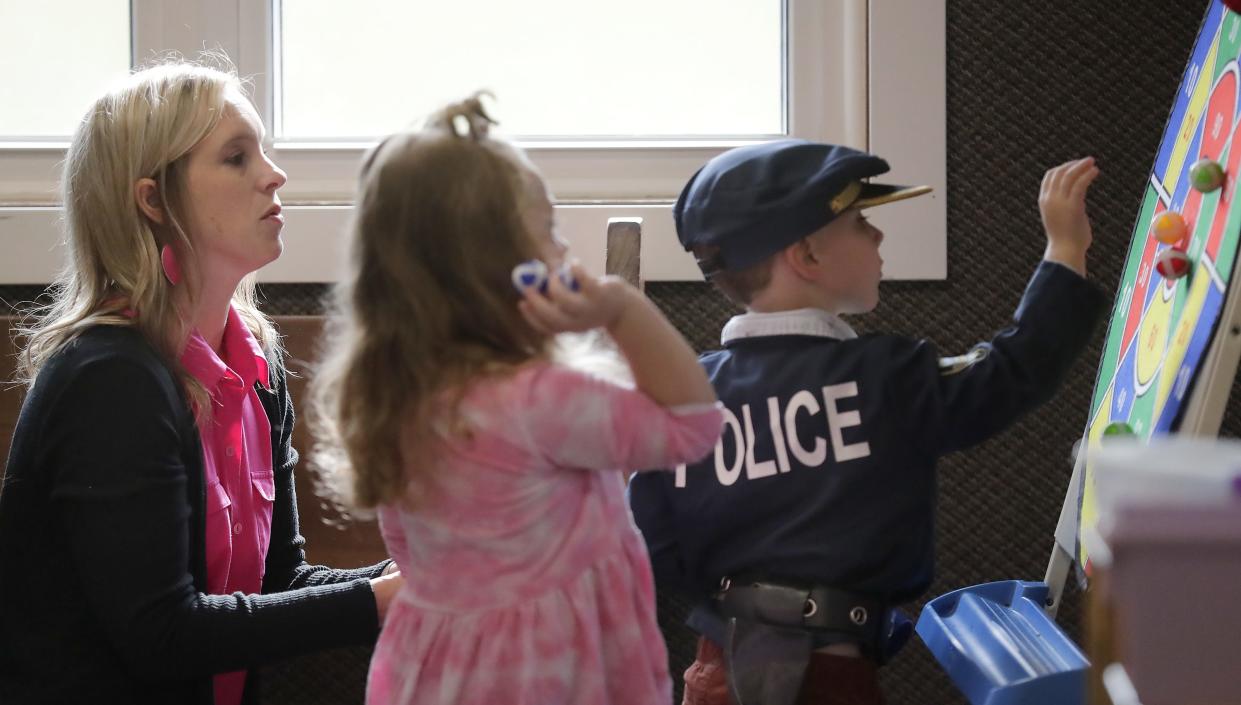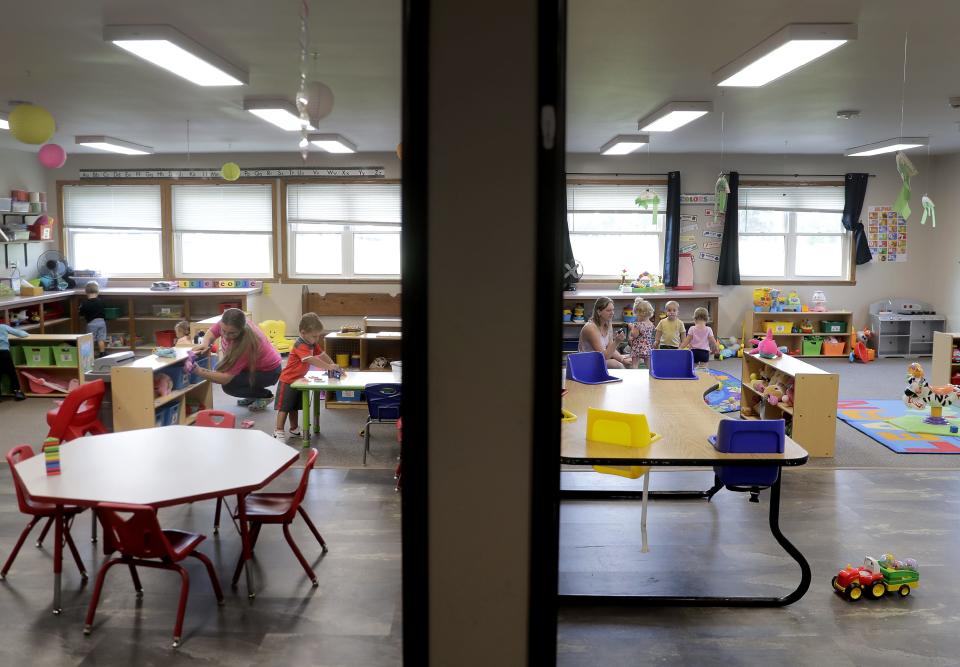Rising child care costs leave Fond du Lac parents struggling as child care centers face burnout and worker shortages

FOND DU LAC — Starting a family in Fond du Lac could cost families more than housing or even college tuition.
The rising cost of child care nationwide is making it hard to support children and their parents in the most important years of their development. While pandemic aid has helped since 2020, that money is about to run out.
Sometimes, people in Fond du Lac's workforce are left to choose between starting a family they've always wanted or furthering their career.
Whether parents leave their children in the care of a child care center, a nanny, a family member or themselves as a stay-at-home parent, the decision of how to best support the youngest population can be hard, both personally and financially.
Child care is pricing out middle working-class families
Barriers to child care in Fond du Lac and beyond include high prices and long waitlists to child care centers, leading many families to leave the workforce or utilize care that's not regulated by the state.
Child Care Counts, a payment program for Wisconsin child care centers that used federal pandemic funds, was not renewed in the state budget in June. The federal Child Care Stabilization Grant Program, which helped fund Child Care Counts, is set to run out at the end of September.
Without a similar program, many centers across the state may need to raise their prices or close their doors.
Angela Schmitz, owner of Lily Pad Learning Center in Fond du Lac, said the rising cost of child care will soon make child care either for the area's wealthy population or the low-income families who are getting subsidies, leaving middle working-class families with few options.
"Families are actually paying more for child care than they would be for (University of Wisconsin) college education," she said.

Without government funding, she will have to raise tuition by 10% in October, which means infant care — the most expensive care — will be about $254 a week. In January, tuition is likely to rise another 10%.
Schmitz opened Lily Pad with her mom seven years ago, after her daughter Lily's child care program closed and she couldn't find any other available, affordable care. Now, the center supports 135 kids with a long waitlist she says is likely similar to other centers' waitlists.
Where to get the best warm drinks: Try these 10 reader-recommended spots for hot drinks this fall in the Fond du Lac area
Low wages are deterring caregivers, causing an employee shortage and burnout
Part of the funding issue is in attracting teachers. An employee shortage is not unique to care centers, but Schmitz said many centers struggle to find quality teachers, in part because of the wages.
Pre-pandemic, the average salary for a child care provider in Wisconsin was about $10.66 an hour, and with government funding the last few years, the average could raise to about $13 an hour.
"It's really tough to encourage people to want to go in such a difficult field," Schmitz said. "It's not babysitting; we are educating the most important population in our community."
She said 90% of brain development happens between the age of birth to 5, and child care programs need dedicated teachers with a passion for working with children and the ability to handle everything that comes with that, including the stress.

The solution is not to increase the number of children in a center, either, because of teacher-to-child ratios, which gets lower the younger a child is.
For instance, the ratio for infant care is one teacher for four children — because infants require the most care — and the ratio for 3-year-olds is one teacher for 10 children, Schmitz said. Many teachers already struggle to take time off, and going beyond the ratio leads to quicker burnout among the teachers.
"Early childhood education can come from a quality center or just quality education provided at home," Schmitz said. "This doesn't mean you can't get these skills at home, just that in this type of environment, we're trained for it."

Few options for many parents include leaving the workforce or depending on family
City Council Vice President and Fond du Lac County Board member Tiffany Brault is an advocate for child care in Fond du Lac, and as a parent herself, knows the experience of leaving a job for her kids.
She left the workforce because her family's income didn't support child care, becoming a stay-at-home parent, and while she's happy to have that time with her kids — especially during the pandemic — she said she wonders if she would be a better mother if she'd been able to go to work in a career she loved.
Her work with city council and the county board has been rewarding, and she feels that she's a little bit of a better mother now that she's been able to work on herself and her personal goals.
"Women shouldn't feel like they should be forced into the workforce, but I know so many women who really want to work, and really enjoy their careers," she said. "We're at a point where I feel like a lot of parents just don't have a choice."
She said according to a Wisconsin Counties Association conference she attended, the number of women in Wisconsin's workforce has dropped below 60%, the lowest it's been in decades.
Many parents have children while still early in their careers, she added, earning entry-level wages that now have to be devoted to care if those parents want to stay in their careers.
As a local official, one of the biggest things Brault learned was that the child care crisis and the child care worker shortage isn't something easily solved through the parents, or even at a local level, but the parents are receiving the consequences.
Her husband is a high school teacher, whose wages are also not sustainable, and with that income alone, her family has been eligible for programs like the U.S. Department of Agriculture's Special Supplemental Nutrition Program for Women, Infants, and Children (WIC) and reduced-price school lunches.
"If we're not making a public investment in child care through state or federal funding or something else, it impacts us because we then have these public assistance programs that more people have to take advantage of just to supplement our family's income," she said.
Additionally, parents often turn to unregulated care, including family members, friends and neighbors, some of whom don't want to take care of children but feel obligated to or guilty if they don't, Brault said.
In a few cases, unregulated care and even stay-at-home parents may not catch developmental delays early on.
Brault's 5-year-old daughter, for instance, had a speech delay that wasn't caught until she was 3. Early childhood teachers who are trained in children and see a child multiple times a week are likely to see something even a pediatrician who sees the same child a few times a year could miss.
"This is my passion issue because it's affected me personally, and I feel like that's one reason why we haven't seen more movement on child care, because so many people making decisions at local levels or state or federal levels aren't in this position where they have young kids at home," she said.
Federal funding is most productive hope for future of child care
Fond du Lac City Council Sept. 13 supported a resolution to encourage the state Legislature to continue funding child care and forwarded the resolution to state officials.
The same resolution before the Fond du Lac County Board the day before failed to be taken for a vote.
Days later, federal lawmakers introduced the Child Care Stabilization Act, which, if approved, would provide $16 billion in America each year for the next five years. As of now, there is not an exact projection of how much Wisconsin would receive if the legislation passes.
Fond du Lac comics shop: What's the best part of owning a comic book store in Fond du Lac? Talking comics with customers, Kevin Flasch says.
What resources are available for struggling families?
A handful of local and regional programs are available for low-income and struggling families. Here's a look at some of them:
ADVOCAP's Head Start program takes in 3- to 5-year-olds from low-income families in a variety of program options, with locations in Fond du Lac, North Fond du Lac, Markesan and Ripon. Eligibility is based on different factors, but parents can schedule an enrollment meeting by contacting Family Engagement Manager Lorri Bohn at 920-922-7760 or lorri.bohn@advocap.org.
The Wisconsin Department of Children and Families' Wisconsin Shares Child Care Subsidy Program supports eligible working families, covering a portion of their monthly child care costs to make care more accessible. More information can be found at dcf.wisconsin.gov/wishares.
First 5 Fox Valley's Help Me Grow program is mainly oriented in Oshkosh and the Appleton area, but Fond du Lac families can still reach out to support@helpmegrowwisconsin.org or 922-422-5437 for support on education, child care and health, as early as pregnancy. The staff will try to help however they can, and more general resources are available on the program website, firstfivefoxvalley.org.
The Museums for All program at the Children's Museum of Fond du Lac can aid families with admissions, membership or program fees, with information on applying available at cmfdl.org/assistance.
The Fond du Lac Family YMCA's Membership for All program also gives a 40% discount on qualifying programs for eligible families. More information is available at fdlymca.org/membership-for-all.html.
Children with developmental delays or disabilities can benefit from Fond du Lac County's Birth to 3 program for early intervention and support with no waiting list or income-based qualifications, and The Arc Fond du Lac's Youth Community Enrichment Program provides year-round age-appropriate activities and events for developmentally disabled children ages 5 and older to meet their peers and experience the community outside of their homes. For more about the Birth to 3 program, call 920-929-3919 or email birthto3@fdlco.wi.gov, and for The Arc's program, email info@arcfdl.org.
Madison Lammert contributed to this report.
Daphne Lemke is the Streetwise reporter for the Fond du Lac Reporter. Contact her at dlemke@gannett.com.
This article originally appeared on Fond du Lac Reporter: Child care costs in Fond du Lac rise as centers face worker shortages

